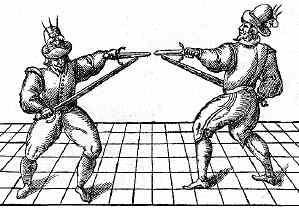Hamlet and Laertes: the duel
The duel, whether for sport or for settling a matter of honour, was a long established tradition in the nobility. The tension in the final scene of Hamlet arises from the different understanding that the two men have of the duel--Hamlet thinks it is a courtly contest, wager and all, whereas Laertes is bent on revenge at any cost.
How honourable is Laertes? He fails to challenge Hamlet openly to a duel to settle the affair of his father's death, and he is deceptive in the method he takes for revenge. That the sword he used was "envenomed" (5.2.319) associates him with the powerful image of poison that courses through the play, from the death of Hamlet's father in the garden, to the poisoned cup (chalice?) Gertrude drinks--and poison was the weapon of the devious and Machiavellian Borgias in Italy.
